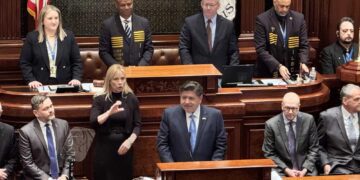Amy Coney Barrett’s record of judicial rulings and legal writings shows that she holds an originalist view of the Constitution, and it provides a glimpse into her opinions on such diverse issues as religious liberty, national healthcare, environmental regulations, the right to life, and the Second Amendment. Here are the facts about the woman who could replace replace Justice Ruth Bader Ginsburg on the Supreme Court.
Biography
Amy Coney Barrett was born to Michael and Linda Coney on January 28, 1972, in New Orleans, where she attended St. Mary’s Dominican High School. Barrett earned a bachelor’s degree in English literature from Rhodes College in 1994 and a juris doctorate from Notre Dame Law School, where she served as executive editor of the law review and finished first in her class. She clerked for Reagan-appointed D.C. Appeals Court Judge Laurence H. Silberman in 1998-1999 and the following year for Supreme Court Justice Antonin Scalia, whom she calls “my mentor.” Barrett went into private practice for two years, then taught for one year at George Washington University School of Law. Since 2002 she has taught at Notre Dame Law School, winning “Distinguished Professor of the Year” three timesand serving as a member of the university’s “Faculty for Life” group.
She and husband, Jesse, have seven children: Emma, Tess, Vivian, John Peter, Liam, Juliet, and Benjamin. The family adopted Vivian, who suffered such severe malnutrition that doctors thought she would never walk, and John Peter from Haiti. Benjamin – “his brothers and sisters unreservedly identify him as their favorite sibling,” Barrett said on Saturday – was born with Down syndrome. Barrett commutes nearly 100 miles from her home in South Bend, Indiana, to Chicago
President Donald Trump appointed Barrett to the Chicago-based U.S. Court of Appeals for the Seventh Circuit May 8, 2017. During the confirmation hearings, Sen. Dianne Feinstein of California and Dick Durbin of Illinois interrogated Barrett over her religious views, asking for her definition of an “orthodox Catholic” and proclaiming, “The dogma lives loudly in you.” The full Senate confirmed Barrett by a 55-43 vote on October 31, 2017. She has commuted 100 miles to the court from her home in South Bend, Indiana, ever since. Barrett had been a frontrunner for the Supreme Court seat left vacant by Justice Anthony Kennedy, but President Trump ultimately selected Justice Brett Kavanaugh to fill the position. (“I’m saving her for Ginsburg,” Trump reportedly said in 2019.) If confirmed, she will be the first mother of school-aged children to serve on the court, as well as being the youngest justice on the current Court and the only one to have earned her law degree somewhere other than Harvard or Yale.
Views on major issues
Barrett’s two-year tenure on a federal appeals court, as well as her publications, furnish evidence about her positions on certain key issues, including:
Affordable Care Act: Few recent Supreme Court decisions have stirred as much controversy as the justices’ decision to affirm the Patient Protection and Affordable Care Act, conventionally known as Obamacare. Barrett critiqued Chief Justice John Roberts’ last-minute change of position on NFIB v. Sebelius in her review of Randy Barnett’s Our Republican Constitution. “Chief Justice Roberts pushed the Affordable Care Act beyond its plausible meaning to save the statute,” she wrote. “He construed the penalty imposed on those without health insurance as a tax, which permitted him to sustain the statute as a valid exercise of the taxing power; had he treated the payment as the statute did – as a penalty – he would have had to invalidate the statute as lying beyond Congress’s commerce power.” Barrett classified this act of jurisprudential transubstantiation as another example of “Roberts’ devotion to constitutional avoidance.” Barrett’s opponents now warn that her low view of Roberts’ reasoning assures that, if she is confirmed, “millions of families’ health care will be ripped away in the middle of a pandemic.”
Religious liberty: Amy Coney Barrett holds a robust view of the First Amendment’s free exercise clause. Barrett joined a ruling that recognizes religious liberty as an inherent and preeminent right under the First Amendment. Barrett was part of a three-judge panel in Illinois Republican Party v. Pritzker (2020), which stated Democratic Illinois Gov. J.B. Pritzker did not have to grant the state Republican Party the same right to gather in larger numbers during the lockdown that churches enjoyed. “There can be no doubt that the First Amendment singles out the free exercise of religion for special treatment,” the opinion held. “Free exercise of religion enjoys express constitutional protection, and the Governor was entitled to carve out some room for religion, even while he declined to do so for other activities.” In addition to speaking before the pro-religious liberty Alliance Defending Freedom, Barrett has signed a 2012 statement saying the Obama administration’s accommodation to its HHS mandate is exceedingly narrow and “fails to remove the assault on individual liberty and the rights of conscience.”
Original intent: Amy Coney Barrett seems to share Justice Antonin Scalia’s jurisprudence, which establishes the meaning of the Constitution based or the original intent of the Founding Fathers. “Originalists, like textualists, care about what people understood words to mean at the time that the law was enacted because those people had the authority to make law,” she wrote. “[A]n originalist submits to the precise compromise reflected in the text of the Constitution. That is how judges approach legal text, and the Constitution is no exception.” She has criticized a “spurious” form of textualism, known as literalism, which holds that the words of the Constitution or the law may be reinterpreted apart from establishing its defining context. “For an originalist, by contrast, the historical meaning of the text is a hard constraint.” She has applied this approach in a well-researched ruling on the Second Amendment. (See below.)
“I have rejected throughout my entire career the proposition that, as you say, the end justifies the means or that a judge should decide cases based on a desire to reach a certain outcome,” she said in her 2017 confirmation hearings.
More HERE







